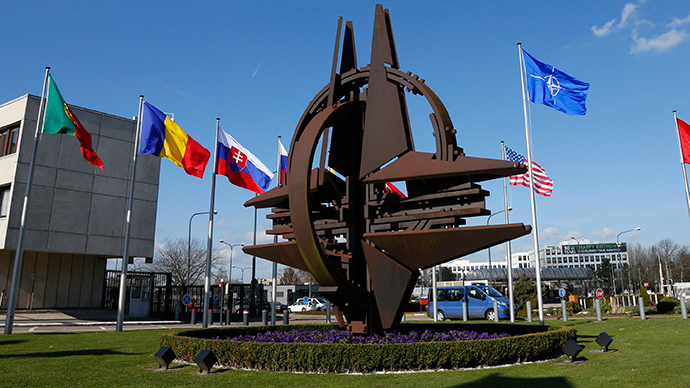The Russian Foreign ministry has criticized the outcome of NATO 's ministerial summit in Brussels this week, claiming the alliance's adopted course of action to increase troop presence at Russian borders is being done to achieve “dominance in Europe.”
During the two-day meeting of NATO defense ministers with their
Ukrainian counterpart, the bloc discussed measures against
so-called “Russian aggression.” Namely, plans to quickly extend
the alliance’s Response Force to 40,000 troops from the current
13,000 and place additional hardware, including tanks on Russian
borders.
The military buildup in six states bordering Russia is a
“dangerous line for promotion of NATO infrastructure,”
the Foreign Ministry said in a statement, adding the summit
continued the trend that was first set out during last year’s
Wales Summit.
READ MORE: NATO to boost special defense forces to 40,000 - Stoltenberg
NATO's eastward expansion, the ministry believes, is being done
“under the false pretext of alleged 'aggressive behavior' by
our country.” The military buildup, the ministry says, is
accompanied by “unfriendly and malicious” rhetoric.
Such an approach is “counter-productive” in military
terms, and also serves as a financial “burden” for
member states, and it “distracts” the alliance’s from
dealing with other threats, such as terrorism, and drug
trafficking, the ministry believes.
“Moreover, such an obvious return by the United States and
its allies to the schemes of Cold War is fraught with an
escalation of tensions and encourages an arms race,” the
statement said. These sorts of actions are “able to poison
the atmosphere for a long time on the European continent.”
Commenting on NATO's heavy hardware expansion in six Eastern
European states, former Polish Vice Admiral Marek Toczek admitted
that dangerous escalation could have catastrophic consequences.
“Either this is saber rattling, or a harbinger of something
that can affect the people of Eastern and Central Europe, and not
only them, –a harbinger of extreme catastrophe of a kind humanity
has never known. In Poland there are many people –their numbers
difficult to estimate in percentage terms, but very likely a
majority, who are against these sorts of political
decisions," Toczek told Sputnik.
READ MORE: NATO conducting biggest beef up of defenses since Cold War – alliance chief
The admiral stressed the need to solve the tensions surrounding
Ukraine through diplomacy and said that the Polish leadership had
agreed to increase the presence of NATO troops and military
equipment as part of a parliamentary pre-election measure ahead
of upcoming elections this fall.
NATO cooperation with Russia has been suspended since April last year over the
Ukrainian crisis.
The Kremlin has continuously denied having troops present in Ukraine or being aggressive towards NATO states. But if NATO threatens Russia’s territories, Moscow will respond to the threat accordingly, President Vladimir Putin said earlier this month.
“If someone threatens our territories, it means that we will have to aim our armed forces accordingly at the territories from where the threat is coming. How else could it be? It is NATO that approaching our borders, it’s not like we are moving anywhere,” Putin said.

